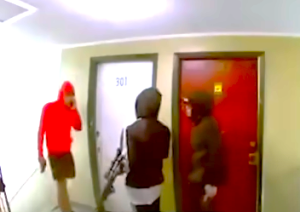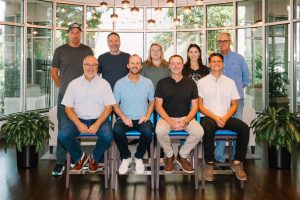In recent weeks, alarming reports have emerged from Aurora, Colorado, where Venezuelan gangs are reportedly taking over apartment buildings as part of an organized criminal effort. The situation has sparked widespread concern, with local authorities and residents grappling with the implications of these developments.

Disturbing Video Footage Goes Viral
A video that has been circulating widely on social media depicts armed individuals, allegedly members of Venezuelan gangs, moving through an apartment complex in Aurora. The footage has drawn national attention and has been a focal point of ongoing discussions about the growing problem. According to Aurora Mayor Mike Coffman, the city’s apartment buildings are being overtaken by these gangs, which have ties to organized crime in Venezuela. Despite local police characterizing the incidents as isolated, the surveillance video reveals a troubling reality in some parts of the city.
The Biden Administration’s Immigration Policies Under Scrutiny
The rise in criminal activity in Aurora is being linked to the Biden administration’s immigration policies, particularly the controversial CHNV (Cuba, Haiti, Nicaragua, and Venezuela) parole program. This initiative, which was designed to provide humanitarian parole to migrants from these four countries, has come under fire for allegedly allowing gang members to enter the United States. Critics argue that the program’s flaws, including widespread fraud and inadequate vetting processes, have contributed to the current situation in Aurora.
Between 2020 and 2022, the number of migrants apprehended from Cuba, Haiti, Nicaragua, and Venezuela surged from 17 to 600. In response, the administration implemented the CHNV program to manage the influx. However, auditors have uncovered significant issues, including migrants lying on their applications, sponsors using fraudulent identities, and traffickers exploiting the system for profit. These revelations have fueled concerns that the program has inadvertently facilitated the entry of dangerous individuals into the country.
Venezuelan Prison Gangs Exploit Loopholes in the System
The gangs involved in the Aurora incidents are believed to include members of Tren de Aragua, a notorious Venezuelan prison gang. These individuals are reportedly extorting tenants and exerting control over multiple apartment buildings in the area. The buildings in question are owned by out-of-state landlords, complicating efforts to address the problem at a local level.
Local authorities have expressed frustration over their limited ability to combat the gangs due to constraints on cooperating with federal agencies like Immigration and Customs Enforcement (ICE) and Homeland Security Investigations (HSI). Although Colorado is not officially a sanctuary state, Denver’s status as a sanctuary city further complicates the situation, with law enforcement facing prohibitions on certain forms of cooperation with federal immigration authorities.
The Challenges of Law Enforcement and Deportation
Law enforcement officials in Aurora are reportedly working with federal agencies to identify and apprehend the gang members involved. However, the process is hindered by several factors. Firstly, the U.S. has limited diplomatic relations with Venezuela, making it nearly impossible to deport individuals back to their home country. As a result, gang members often operate with impunity, knowing that even if they are arrested, they are unlikely to be deported or held for long.
Critics argue that the CHNV program, despite its suspension and subsequent reinstatement, continues to pose significant risks. The program’s failure to thoroughly vet sponsors has allowed some individuals to sponsor large numbers of migrants—3,000 sponsors were found to have sponsored over 100,000 individuals. This lack of oversight has created opportunities for criminal elements to exploit the system, further complicating efforts to maintain public safety.
A Complex and Ongoing Problem
The situation in Aurora underscores the complexities of managing immigration and public safety in the context of strained international relations and domestic policy challenges. As the local police continue to work with federal agencies to address the gang activity, the broader implications of the CHNV program and similar initiatives are likely to remain a topic of heated debate.
The ongoing issues highlight the need for more robust mechanisms to vet migrants and sponsors, as well as improved cooperation between local and federal authorities. With no immediate solution in sight, Aurora and other affected communities may continue to face the challenges posed by the influx of migrants and the criminal elements that have taken advantage of the situation.


